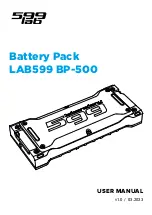
3
Dear Customer,
Congratulations on buying this product. Like all other
products from SBM group, this item was developed on
the basis of state-of-the-art engineering and using the
most reliable and modern electrical/electronic compo-
nents. Please spare a few minutes of your time to study
the directions for use before using your new purchase
for the
fi
rst time.
Thank you.
(CE) This article conforms with all binding European
standards.
OPERATION
1. Make sure that all electric equipment of rechargable
car is turned off, but the power is on.
2. Put the device into the cigarette lighter socket of
both cars. Recharging car engine must be started.
3. About 10-15 minutes later, when the red LED turns
to green, before start the engine of bad car,remove
the plugs from the cigarette light sockets on both
cars.
1. IMPORTANT INFORMATION!
• To prevent sparking due to electrostatic discharge,
never wear clothes made of synthetic materials
when charging the battery.
•
DANGER!
Explosive gases - avoid
fl
ames and
sparks.
• The charger contains components such as the
switch and fuse that may cause arcing and sparking.
Make sure the garage or room is well ventilated!
• The charger is designed only for lead-acid batter-
ies.
• Never use appliance to charge „non-rechargeable
batteries" or defective batteries.
• Note the instructions published by the battery manu-
facturer.
•
Danger!
Avoid
fl
ames and sparks. Explosive elec-
trolytic gas is released during charging.
• Protect from rain, splashing water and damp condi-
tions.
• Place the charger on a heated surface.
• Keep the ventilation slots free of dirt.
•
Caution! Battery acid is corrosive. It any acid is
splashed on your skin or clothes, wash off im-
mediately with suds. If acid is splashed in your
eyes, rinse out immediately with water (for 15
minutes) and consult a doctor.
• Do not short-circuit the charging clamps.
• The power supply cable and the charging leads
have to be in perfect condition.
• Keep children away from the battery and the charg-
er.
• Never use the cable for any purpose other than its
intended purpose.
• Do not carry the appliance by its cable and never
pull on the cable to remove the plug from the socket-
outlet. Protect the cable from heat, oil and sharp
edges.
• Examine your appliance for signs of damage. Have
defective or damaged parts repaired or replaced
by a customer service workshop unless otherwise
stated in these operating instructions.
• Observe the mains voltage (12V DC).
• Keep the terminals clean and protect them from cor-
rosion.
• Always disconnect the appliance from the power
supply before carrying out any cleaning or mainte-
nance work.
•
Wear acid-proof safety gloves and goggles
whenever you connect up and charge the bat-
tery and whenever you
fi
ll in acid or top up with
distilled water.
• Have repairs carried out only by a quali
fi
ed electri-
cian.
Disposal
• Batteries: Dispose of unwanted batteries only via
automotive workshops, special battery collection
stations or special waste collection centres. Ask
your local authorities for details.
5. SERVICING AND CLEANING
THE BATTERY AND CHARGER
• Make sure that your battery is always
fi
tted securely
in.
• Check that the battery is properly connected to the
vehicle's electric system.
• Keep the battery clean and dry. Apply a little acid-
free and acid-resistant grease (Vaseline) to the ter-
minals.
• The level of acid in non-maintenance-free batteries
should be checked about every 4 weeks. Top up
with distilled water as necessary.
• Keep the charger in a dry room. Remove any signs
of corrosion from the charging terminals.






























